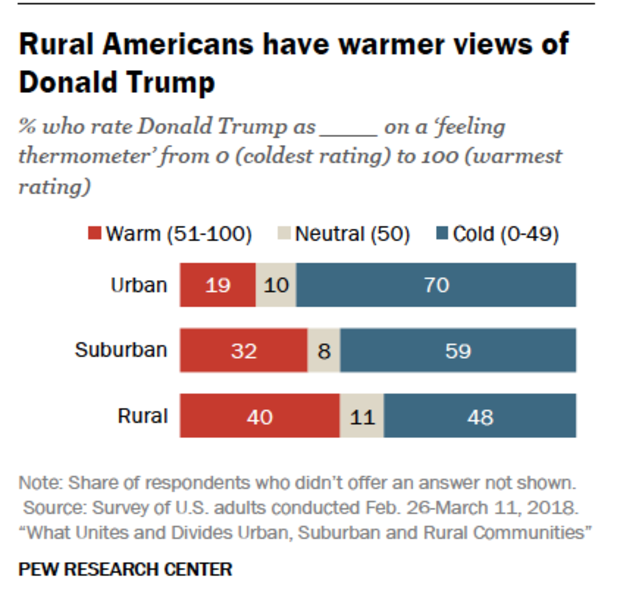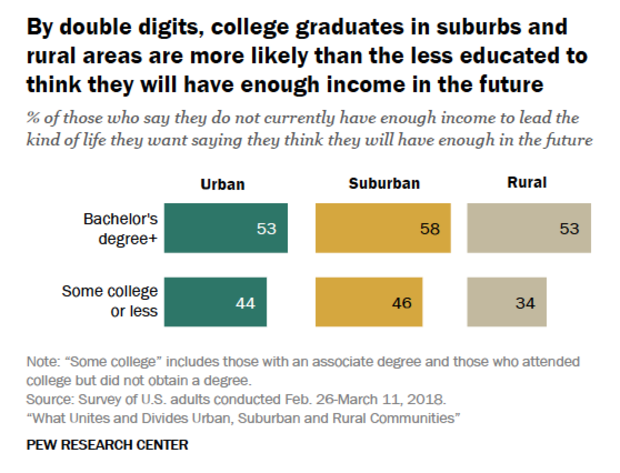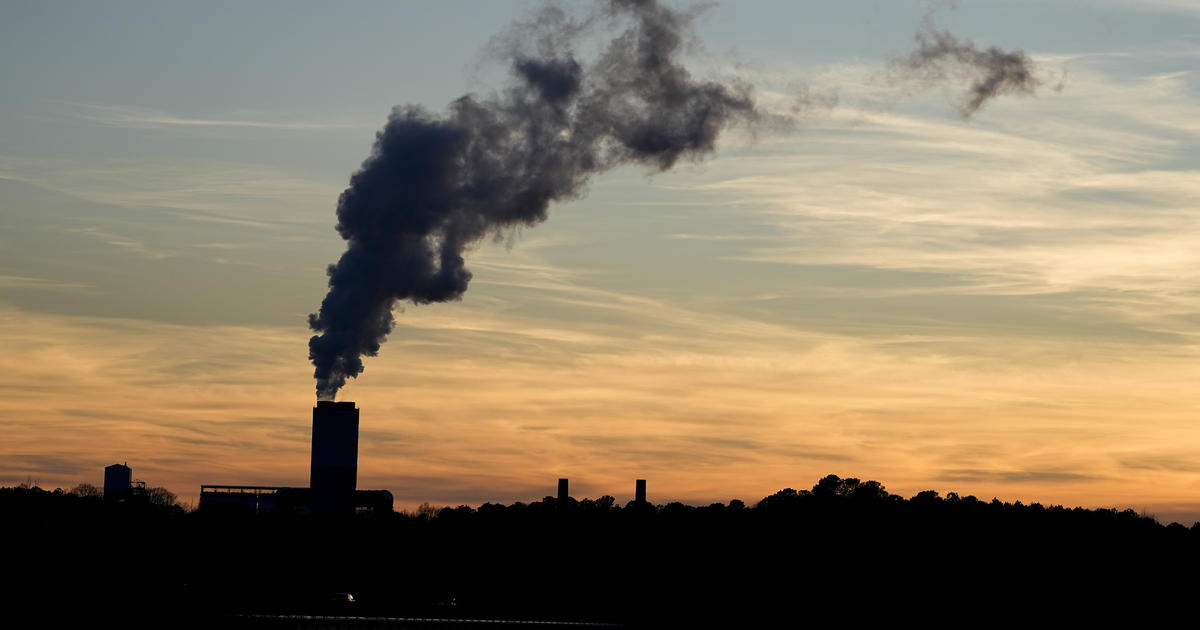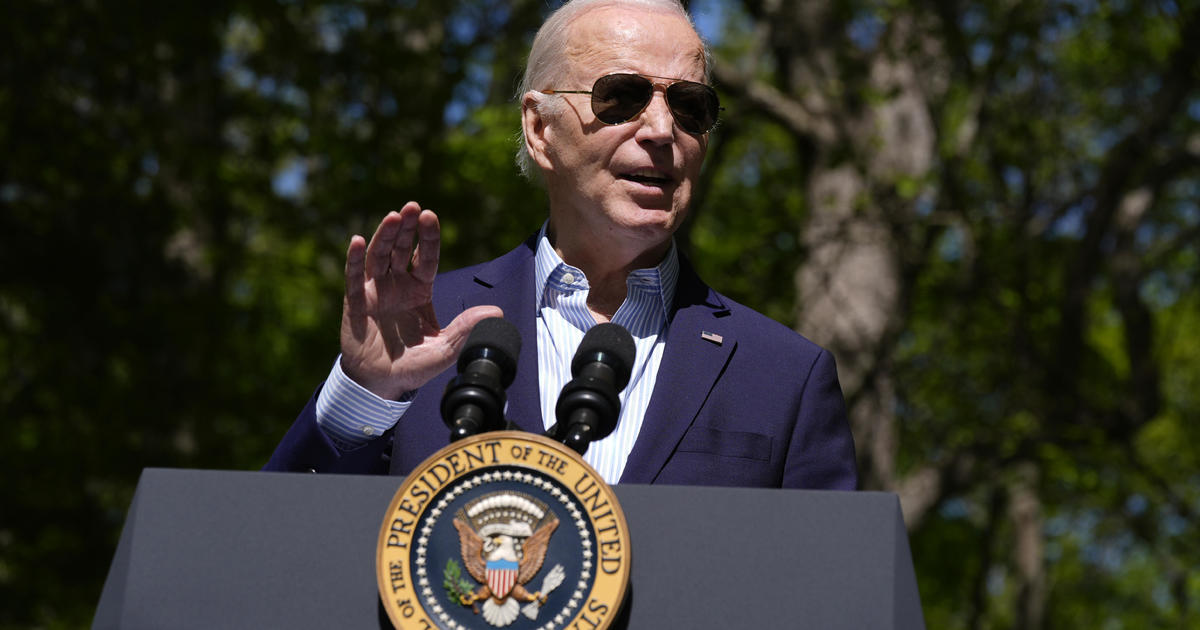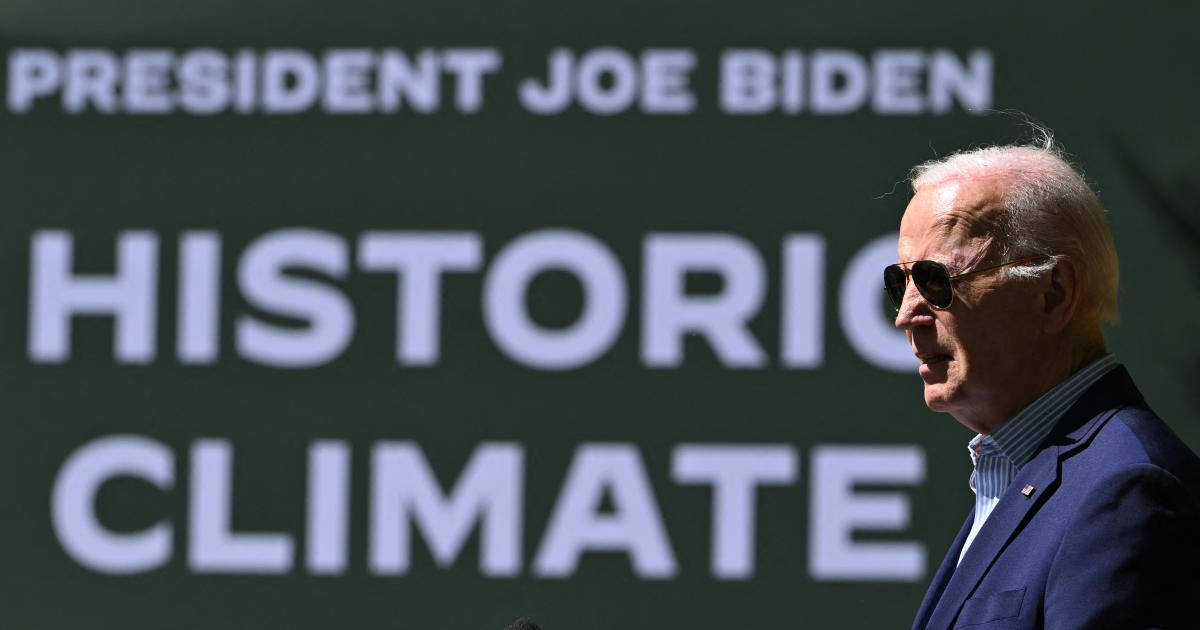How community type and education reveal American divisions — Pew report
"Today we are not really transferring power from one administration to another, or one party to another, we are transferring power from Washington, D.C., and giving it back to you, the people," President Trump declared in his inauguration address in January 2017. "Washington flourished, but the people did not share in its wealth."
Arguably, Mr. Trump's populist rhetoric, which defied the D.C. "elite" and those who don't understand "real" America, won him the presidency with strong support from the heartland and rust belt that turned out for him in large numbers. A new survey from the Pew Research Center puts data behind some of those divisions, revealing how Americans' educational attainment and where they live -- in an urban, suburban or rural environment -- correspond to vastly different political views, economic outlooks, and beliefs in whether people who live elsewhere share their values.
The deepening divide between rural and urban America, and between college-educated and non-college-educated America is one recent books like "Hillbilly Elegy" and "Strangers in Their Own Land," among others, have attempted to illustrate. Pew, said associate director of research Juliana Horowitz, has studied various issues that appear in the survey before, but decided to undertake this study after talk of a rural-urban divide highlighted in the 2016 presidential election. Much of the data supports things that have been said anecdotally, but they wanted to "take a broader look," she said. The study comes as a smaller and smaller percentage of the population is living in rural areas, and the earnings gap between college-educated Americans and non-college educated Americans appears to only be widening.
Communities: Urban, rural, suburban
Perhaps unsurprisingly, Pew's study finds Americans in urban communities are more likely to identify as Democrats, and those in rural communities are more likely to identify as Republicans. Among registered voters in urban areas, 62 percent identify as Democrats, versus 31 percent who identify as Republicans. Democrats also have a slight edge in suburban areas, with 47 percent of registered voters identifying as or leaning towards being Democrats, and 45 percent identifying as Republican or leaning Republican. More voters in suburbs have identified as Democrats in the last couple years, according to Pew — potentially a bad sign for the GOP ahead of the 2018 midterms. Of those in rural areas, however, 54 percent of registered voters identify as Republican, and 38 percent identify as Democrats.
Feelings about Trump
Americans of all community types are more likely to express "cold" feelings towards Mr. Trump than warm — including those in rural communities, although they are still the most receptive. On what Pew described as a "feelings thermometer," rating from 0 (very cold) to 100 (very warm), 40 percent of those in rural communities expressed a warm view of the president, versus 48 percent cold. Of those in suburban communities, only 32 percent express a "warm" feeling towards the president, and 59 percent a "cold" feeling; and among urban Americans, only 19 percent express a "warm" sentiment towards the president, with 70 percent expressing a "cold" sentiment towards him, Pew finds.
But the report points not just to discrepancies in political party alignment — perhaps even more importantly, it points to a lack of perceived commonality in values and understanding.
Urban, suburban and rural communities also see a values gap, but again, rural residents see the greatest difference between themselves and other community types. Of those in urban areas, 53 percent say those in rural communities don't share their values. Of those in rural communities, 58 percent say those in urban communities don't share their values. Only those in suburban communities are more likely to agree than to disagree that both other community types share their values.
Americans of all communities are likely to say they feel misunderstood by those of different community types. But rural residents feel the most misunderstood. Of rural residents, 70 percent say most people who live in different types of communities don't understand the problems they face. Among urban dwellers, 65 percent say they feel misunderstood, and among suburban voters, just a little more than half — 52 percent — say they feel misunderstood by other types of communities. Horowitz said that after the 2016 election in particular, there was a narrative that rural communities in America felt misunderstood — but the same can also be said to a large extent of those in cities.
"They are similar in that way — they're similar in that they're feeling misunderstood and looked down on," Horowitz said.
The demographics of rural America set it apart as well. Rural America is also aging more rapidly than the rest of the country, and its communities have lost working-age residents while the working-age population of suburban and urban communities has grown. While 18 percent of the population in rural counties is over 65, just 13 percent is in cities, according to Pew.
Rural communities are also the least racially diverse, and have fewer immigrants. U.S. urban counties now have more non-white than white residents, with white Americans making up only 44 percent of American urban communities. Rural communities, on the other hand, are still overwhelmingly white — 79 percent, for the years from 2012 to 2016. And while the share of foreign-born residents was on the rise in all communities over that same period, just 4 percent of residents of rural counties are foreign-born, compared to 22 percent of urban and 11 percent of suburban counties.
When it comes to economic and employment prospects, those in rural communities are the least optimistic about the future of jobs in their community, while those in urban areas are the most optimistic, followed by those in suburbs.
Does college make a difference?
The divisions in America aren't just rural, suburban and urban — in some scenarios, a person's educational attainment has much more to do with their sense of well being than where they live. While a bachelor's degree isn't a perfect indicator of social class, many economists and social scientists view it as the simplest and most reliable indicator.
When it comes to how people view their own economic prospects, a college degree has much more to do with Americans' expecation of future success than where they live, even as rural America struggles to offer sufficient jobs for its workforce.
While a college degree has generally always led to more financial success in the U.S., that is more the case now than ever — and it's leaving those with only some college or less at a greater disadvantage. In 2015, college graduates, on average, earned 56 percent more than their high school graduate peers — the largest such gap in the Economic Policy Institute's figures dating to 1973.
College-educated Americans across all community types are likely to think they will have enough income in the future, while those with less than a bachelor's degree do not think they will, Pew finds. Of those who say they currently do not have enough financial success to lead the life they want, but have bachelor's degrees, 53 percent in urban environments, 58 percent in suburbs and 53 percent in rural communities think they will have enough in the future. But among those who are not satisfied with their income level and lack a bachelor's degree, only 44 percent of urban dwellers, 46 percent of suburban dwellers, and 34 percent of rural dwellers think they will in the future.
Whether or not someone holds a bachelor's degree also relates to their general optimism for the future, more so than what types of community they call home. Among those with bachelor's degrees, 53 percent say they feel optimistic about their life all or most of the time, compared with 53 percent in suburbs and 55 percent in rural areas. But for those who lack a college degree, only 36 percent of those in urban areas, 39 percent in suburbs and 39 percent in rural areas say the same.
Those without a bachelor's degree are also more likely to view crime as a problem in their community, whatever their community type.
Concerns about drug addiction in the community are greatest for those without a college degree. Among those with a college degree, 39 percent in urban areas and 39 percent of those in rural areas (and just 27 percent of those in suburban communities) say drug addiction is a major problem in the local community. But those figures are much higher for those without a bachelor's degree. Of that population, 55 percent in urban areas, 39 percent in suburban areas and 47 percent in rural areas say drug addiction is a major problem in their communities.
Pew's latest study seems to beg the question — can those in different communities, and of different educational attainment, reach a place where they believe others understand them and share their values?
